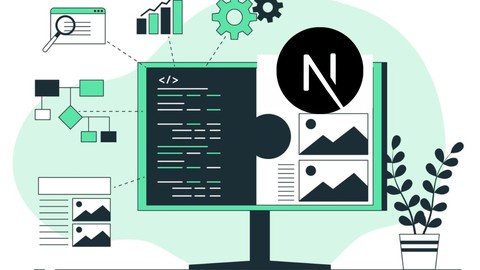
Next.js: The React Framework
Next.js: The React Framework, available at $54.99, with 17 lectures.
You will learn about Understand core Next js features and benefits over traditional React development. Set up and structure new Next js projects efficiently. Implement various routing techniques, from basic to advanced, including nested and parallel routes. Master intercepting routes for better control over user navigation. Explore diverse styling approaches in Next js, such as CSS Modules, Sass, and styled-jsx. Learn how to manage assets and optimize images for improved performance. Implement metadata and SEO best practices to enhance website visibility. Understand different data fetching methods in Next js (SSR, SSG, client-side). Build projects with Prisma and SQLite, utilizing Next js route handlers for data management. Create and manage API routes effectively. Harness the power of Middleware and Edge Runtime for enhanced functionality. Implement custom loading UI for a smoother user experience. Create a custom 404 page for improved user guidance. Learn how to handle and manage runtime segment errors and global errors effectively. Apply learned concepts by building practical projects using Next js 14. Gain proficiency in deploying Next js applications to Vercel, including GitHub integration. Review common interview questions and essential Next js concepts for career advancement. This course is ideal for individuals who are Frontend Developers: Professionals who want to deepen their understanding of React and enhance their skills in building performant, server-side rendered applications. or React Developers: Developers with experience in React looking to expand their knowledge to include server-side rendering, static site generation, and other advanced features offered by Next js. or Newbies and beginners aspiring for a career in web development, software, and application development. or Anyone interested in building web apps using React and Next js Frameworks. or Full-Stack Developers: Individuals who work on both frontend and backend tasks and are interested in learning how to build complete web applications using Next js, including API routes and serverless functions. or Web Application Developers: Developers interested in modern web application development techniques, including static and dynamic rendering, improved SEO, and performance optimization. or Tech Leads and Architects: Professionals responsible for making decisions about technology stacks and wanting to understand the benefits of Next js for building scalable and high-performance web applications. or Product Managers: Individuals who oversee web development projects and want to understand the capabilities of Next js to make informed decisions about its use in their products. or Backend Developers: Developers with a backend focus who are looking to learn frontend technologies, particularly how to integrate backend services with modern frontend frameworks like Next js. or Technical Entrepreneurs and Startups: Entrepreneurs and startup teams interested in leveraging Next js for building their web applications efficiently with features like server-side rendering and static site generation. or Students and Junior Developers: Beginners and students in web development looking to acquire modern skills in web development frameworks, particularly those interested in React and Next js. or Web Designers: Designers who want to understand how their designs can be implemented using Next js and its features, particularly in terms of performance and SEO benefits. It is particularly useful for Frontend Developers: Professionals who want to deepen their understanding of React and enhance their skills in building performant, server-side rendered applications. or React Developers: Developers with experience in React looking to expand their knowledge to include server-side rendering, static site generation, and other advanced features offered by Next js. or Newbies and beginners aspiring for a career in web development, software, and application development. or Anyone interested in building web apps using React and Next js Frameworks. or Full-Stack Developers: Individuals who work on both frontend and backend tasks and are interested in learning how to build complete web applications using Next js, including API routes and serverless functions. or Web Application Developers: Developers interested in modern web application development techniques, including static and dynamic rendering, improved SEO, and performance optimization. or Tech Leads and Architects: Professionals responsible for making decisions about technology stacks and wanting to understand the benefits of Next js for building scalable and high-performance web applications. or Product Managers: Individuals who oversee web development projects and want to understand the capabilities of Next js to make informed decisions about its use in their products. or Backend Developers: Developers with a backend focus who are looking to learn frontend technologies, particularly how to integrate backend services with modern frontend frameworks like Next js. or Technical Entrepreneurs and Startups: Entrepreneurs and startup teams interested in leveraging Next js for building their web applications efficiently with features like server-side rendering and static site generation. or Students and Junior Developers: Beginners and students in web development looking to acquire modern skills in web development frameworks, particularly those interested in React and Next js. or Web Designers: Designers who want to understand how their designs can be implemented using Next js and its features, particularly in terms of performance and SEO benefits.
Enroll now: Next.js: The React Framework
Summary
Title: Next.js: The React Framework
Price: $54.99
Number of Lectures: 17
Number of Published Lectures: 17
Number of Curriculum Items: 17
Number of Published Curriculum Objects: 17
Original Price: $19.99
Quality Status: approved
Status: Live
What You Will Learn
- Understand core Next js features and benefits over traditional React development.
- Set up and structure new Next js projects efficiently.
- Implement various routing techniques, from basic to advanced, including nested and parallel routes.
- Master intercepting routes for better control over user navigation.
- Explore diverse styling approaches in Next js, such as CSS Modules, Sass, and styled-jsx.
- Learn how to manage assets and optimize images for improved performance.
- Implement metadata and SEO best practices to enhance website visibility.
- Understand different data fetching methods in Next js (SSR, SSG, client-side).
- Build projects with Prisma and SQLite, utilizing Next js route handlers for data management.
- Create and manage API routes effectively.
- Harness the power of Middleware and Edge Runtime for enhanced functionality.
- Implement custom loading UI for a smoother user experience.
- Create a custom 404 page for improved user guidance.
- Learn how to handle and manage runtime segment errors and global errors effectively.
- Apply learned concepts by building practical projects using Next js 14.
- Gain proficiency in deploying Next js applications to Vercel, including GitHub integration.
- Review common interview questions and essential Next js concepts for career advancement.
Who Should Attend
- Frontend Developers: Professionals who want to deepen their understanding of React and enhance their skills in building performant, server-side rendered applications.
- React Developers: Developers with experience in React looking to expand their knowledge to include server-side rendering, static site generation, and other advanced features offered by Next js.
- Newbies and beginners aspiring for a career in web development, software, and application development.
- Anyone interested in building web apps using React and Next js Frameworks.
- Full-Stack Developers: Individuals who work on both frontend and backend tasks and are interested in learning how to build complete web applications using Next js, including API routes and serverless functions.
- Web Application Developers: Developers interested in modern web application development techniques, including static and dynamic rendering, improved SEO, and performance optimization.
- Tech Leads and Architects: Professionals responsible for making decisions about technology stacks and wanting to understand the benefits of Next js for building scalable and high-performance web applications.
- Product Managers: Individuals who oversee web development projects and want to understand the capabilities of Next js to make informed decisions about its use in their products.
- Backend Developers: Developers with a backend focus who are looking to learn frontend technologies, particularly how to integrate backend services with modern frontend frameworks like Next js.
- Technical Entrepreneurs and Startups: Entrepreneurs and startup teams interested in leveraging Next js for building their web applications efficiently with features like server-side rendering and static site generation.
- Students and Junior Developers: Beginners and students in web development looking to acquire modern skills in web development frameworks, particularly those interested in React and Next js.
- Web Designers: Designers who want to understand how their designs can be implemented using Next js and its features, particularly in terms of performance and SEO benefits.
Target Audiences
- Frontend Developers: Professionals who want to deepen their understanding of React and enhance their skills in building performant, server-side rendered applications.
- React Developers: Developers with experience in React looking to expand their knowledge to include server-side rendering, static site generation, and other advanced features offered by Next js.
- Newbies and beginners aspiring for a career in web development, software, and application development.
- Anyone interested in building web apps using React and Next js Frameworks.
- Full-Stack Developers: Individuals who work on both frontend and backend tasks and are interested in learning how to build complete web applications using Next js, including API routes and serverless functions.
- Web Application Developers: Developers interested in modern web application development techniques, including static and dynamic rendering, improved SEO, and performance optimization.
- Tech Leads and Architects: Professionals responsible for making decisions about technology stacks and wanting to understand the benefits of Next js for building scalable and high-performance web applications.
- Product Managers: Individuals who oversee web development projects and want to understand the capabilities of Next js to make informed decisions about its use in their products.
- Backend Developers: Developers with a backend focus who are looking to learn frontend technologies, particularly how to integrate backend services with modern frontend frameworks like Next js.
- Technical Entrepreneurs and Startups: Entrepreneurs and startup teams interested in leveraging Next js for building their web applications efficiently with features like server-side rendering and static site generation.
- Students and Junior Developers: Beginners and students in web development looking to acquire modern skills in web development frameworks, particularly those interested in React and Next js.
- Web Designers: Designers who want to understand how their designs can be implemented using Next js and its features, particularly in terms of performance and SEO benefits.
A warm welcome to the Next.jscourse by Uplatz.
Next.js is a popular React framework for building server-side rendered (SSR) web applications and static websites. Developed by Vercel, it simplifies the development of React applications by providing a range of features that enhance performance, scalability, and developer experience.
How Next.js works
Next.js operates on top of React and provides a set of functionalities that facilitate rendering and routing. Here’s a high-level overview of how it works:
-
Server-Side Rendering (SSR)
-
Initial Request: When a user requests a page, Next.js generates the HTML on the server for the initial load. This improves SEO and page load times.
-
Hydration: After the initial load, Next.js sends the JavaScript bundle to the client, which “hydrates” the page, making it interactive.
-
-
Static Site Generation (SSG)
-
Pre-rendering: For static pages, Next.js generates HTML at build time, which is served directly from a CDN. This provides fast load times and improves performance.
-
-
API Routes
-
Serverless Functions: Next.js allows you to define API routes directly within your application. These are serverless functions that handle backend logic and can be used for tasks like form submissions or data fetching.
-
-
File-Based Routing
-
Dynamic Routes: Next.js uses a file-based routing system where the file structure in the pages directory corresponds to the routes in the application. Dynamic routes can be created using file names enclosed in square brackets.
-
-
Automatic Code Splitting
-
On-Demand Loading: Next.js automatically splits your code and loads only the necessary JavaScript for the requested page, improving load times and performance.
-
-
CSS and Sass Support
-
Built-in Support: Next.js provides built-in support for CSS and Sass. You can import styles directly into your components or use CSS modules for scoped styling.
-
Key Features of Next.js
-
Server-Side Rendering (SSR)
-
Enables generating HTML on the server for each request, enhancing SEO and load times.
-
-
Static Site Generation (SSG)
-
Allows pre-rendering of pages at build time, resulting in fast performance and easy deployment.
-
-
Incremental Static Regeneration (ISR)
-
Enables updating static content after the build without rebuilding the entire site. This allows for static pages to be updated incrementally.
-
-
File-Based Routing
-
Uses a simple file-based routing system where files in the pages directory automatically become routes in the application.
-
-
API Routes
-
Provides a way to create backend endpoints as serverless functions, simplifying server-side logic management.
-
-
Automatic Code Splitting
-
Splits code automatically to load only the necessary JavaScript for the requested page, improving performance.
-
-
Built-in CSS and Sass Support
-
Supports importing CSS and Sass files, along with CSS Modules for scoped styles.
-
-
TypeScript Support
-
Out-of-the-box TypeScript support, making it easy to integrate TypeScript into your Next.js application.
-
-
Image Optimization
-
Provides an Image component for automatic optimization of images, including lazy loading and responsive sizing.
-
-
Fast Refresh
-
Features fast refresh for React components, providing immediate feedback during development without losing component state.
-
Next.js combines these features to create a highly efficient and developer-friendly framework for building modern web applications, balancing the benefits of both static and dynamic rendering.
Next.js – Course Curriculum
Module 1: Introduction to Next.js
-
Getting Started with Next.js: An Overview and Benefits
-
Description: Introduction to Next.js, exploring its core features and the advantages it offers for modern web development.
-
-
Kickstarting Your Next.js Project: Setup and Structure
-
Description: Learn how to create a Next.js application using the create-next-app command and navigate the project folder structure.
-
Module 2: Routing in Next.js
-
Mastering Next.js Routing: From Basics to Advanced Techniques
-
Description: Discover various routing techniques in Next.js, including basic, dynamic, nested, and catch-all routes for building complex applications.
-
-
Building Efficient Navigation with Parallel Routes in Next.js
-
Description: Implement parallel routes in Next.js by developing a small, practical application to enhance navigation.
-
-
Advanced Routing Techniques: Intercepting Routes in Next.js
-
Description: Explore techniques for intercepting routes, including soft and direct route interception, to improve navigation and user flow.
-
Module 3: Styling in Next.js
-
Styling Your Next.js Application: A Comprehensive Guide
-
Description: A deep dive into styling methods available in Next.js 14, including CSS Modules, Sass, styled-jsx, and other approaches to effectively style your application.
-
Module 4: Asset Management and SEO
-
Optimizing Images, Metadata, and SEO in Next.js
-
Description: Learn how to handle images and static files, configure metadata for pages, and implement SEO optimization techniques to enhance your site’s visibility.
-
Module 5: Data Management
-
Data Fetching in Next.js: Best Practices and Techniques
-
Description: Explore different methods of data fetching in Next.js, including Server-Side Rendering (SSR), Static Site Generation (SSG), and client-side fetching to improve application performance.
-
-
Next.js Project with Prisma and SQLite: A Practical Approach
-
Description: Create a project using Prisma for database management and SQLite, utilizing the latest Next.js route handlers to manage data effectively.
-
Module 6: API Routes and Middleware
-
Building and Managing API Routes in Next.js
-
Description: A comprehensive overview of creating and managing API routes in Next.js, including various routing strategies and best practices.
-
-
Harnessing the Power of Middleware in Next.js
-
Description: In-depth discussion on Next.js Middleware and Edge Runtime, with practical examples of how to implement them to enhance application functionality.
-
Module 7: User Experience Enhancements
-
Enhancing UX with Custom Loading UI in Next.js
-
Description: Explore different methods to create effective loading states in your application, improving user experience during data fetching or page transitions.
-
-
Creating a Custom 404 Page in Next.js: Enhancing User Experience
-
Description: Learn how to design a custom “Not Found” page in Next.js and display site-specific information to guide users when they encounter a missing page.
-
Module 8: Error Handling
-
Error Handling in Next.js: Managing Runtime and Global Errors
-
Description: Understand how to handle and manage both runtime segment errors and global errors within your Next.js applications to ensure robustness and reliability.
-
Module 9: Building Projects
-
Hands-On Project: Building with Next.js 14
-
Description: Apply the concepts learned by building a small project that incorporates various Next.js 14 features, reinforcing your understanding through practical application.
-
-
Building a Project with Prisma and SQLite: A Practical Approach
-
Description: Dive deeper into building projects with Prisma and SQLite, utilizing the latest Next.js route handlers to manage data and backend integration.
-
Module 10: Deployment
-
Deploying Next.js Apps: A Complete Guide to Vercel
-
Description: Step-by-step guide on deploying your Next.js application to Vercel, including integration with GitHub and managing deployments for seamless updates.
-
Module 11: Interview Preparation
-
Ace Your Next.js Interviews: Key Questions and Concepts
-
Description: Review common interview questions and essential concepts related to Next.js to prepare effectively for job interviews and demonstrate your expertise.
-
Course Curriculum
Chapter 1: Introduction to Next.js
Lecture 1: Introduction to Next.js
Chapter 2: Starting Next.js Project
Lecture 1: Starting Next.js Project
Chapter 3: Routing
Lecture 1: Routing
Chapter 4: Styling
Lecture 1: Styling
Chapter 5: Images, Static Files, Metadata, and SEO
Lecture 1: Images, Static Files, Metadata, and SEO
Chapter 6: Data Fetching
Lecture 1: Data Fetching
Chapter 7: API Routes
Lecture 1: API Routes
Chapter 8: Middleware
Lecture 1: Middleware
Chapter 9: Small Project
Lecture 1: Small Project
Chapter 10: Deployment
Lecture 1: Deployment
Chapter 11: Prisma and SQLite Project
Lecture 1: Prisma and SQLite Project
Chapter 12: Custom 404 Page
Lecture 1: Custom 404 Page
Chapter 13: Loading UI
Lecture 1: Loading UI
Chapter 14: Parallel Routes
Lecture 1: Parallel Routes
Chapter 15: Handling Errors
Lecture 1: Handling Errors
Chapter 16: Intercepting Routes
Lecture 1: Intercepting Routes
Chapter 17: Next.js Interview Questions
Lecture 1: Next.js Interview Questions
Instructors
-
Uplatz Training
Fastest growing global Technology & Cloud Training Provider
Rating Distribution
- 1 stars: 0 votes
- 2 stars: 0 votes
- 3 stars: 0 votes
- 4 stars: 0 votes
- 5 stars: 0 votes
Frequently Asked Questions
How long do I have access to the course materials?
You can view and review the lecture materials indefinitely, like an on-demand channel.
Can I take my courses with me wherever I go?
Definitely! If you have an internet connection, courses on Udemy are available on any device at any time. If you don’t have an internet connection, some instructors also let their students download course lectures. That’s up to the instructor though, so make sure you get on their good side!
You may also like
- Top 10 Content Creation Courses to Learn in December 2024
- Top 10 Game Development Courses to Learn in December 2024
- Top 10 Software Testing Courses to Learn in December 2024
- Top 10 Big Data Courses to Learn in December 2024
- Top 10 Internet Of Things Courses to Learn in December 2024
- Top 10 Quantum Computing Courses to Learn in December 2024
- Top 10 Cloud Computing Courses to Learn in December 2024
- Top 10 3d Modeling Courses to Learn in December 2024
- Top 10 Mobile App Development Courses to Learn in December 2024
- Top 10 Graphic Design Courses to Learn in December 2024
- Top 10 Videography Courses to Learn in December 2024
- Top 10 Photography Courses to Learn in December 2024
- Top 10 Language Learning Courses to Learn in December 2024
- Top 10 Product Management Courses to Learn in December 2024
- Top 10 Investing Courses to Learn in December 2024
- Top 10 Personal Finance Courses to Learn in December 2024
- Top 10 Health And Wellness Courses to Learn in December 2024
- Top 10 Chatgpt And Ai Tools Courses to Learn in December 2024
- Top 10 Virtual Reality Courses to Learn in December 2024
- Top 10 Augmented Reality Courses to Learn in December 2024






















